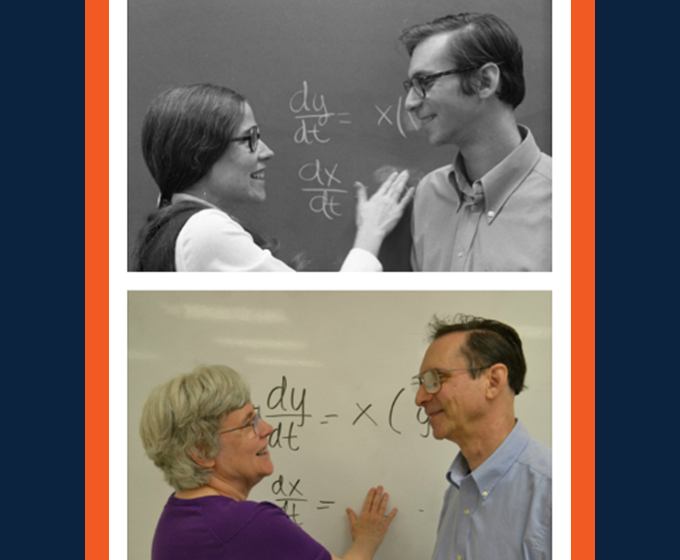
Kay and Steve Robbins commemorate more than 40 years of service at UTSA with a fellowship they established for the Department of Computer Science.
SEPTEMBER 21, 2021 — Two retired UTSA faculty members, a married couple, are supporting the university through a unique gift to help future generations of computer scientists. Kay and Steve Robbins, professors emeriti from the UTSA College of Sciences Department of Computer Science, have established the Kay and Steve Robbins Faculty Teaching Fellowship Award in Computer Science.
The Kay and Steve Robbins Faculty Teaching Fellowship Award will propel teaching innovations by computer science faculty in course and program development, and career skills development. The fellowship is fully funded and will begin distributions in November 2021.
"The pandemic has presented some challenges for teaching and learning, but also opportunities for innovative use of technology, especially new technologies,” said Kay and Steve Robbins in a joint statement. “We have always thought we might bequeath something to UTSA sometime in the distant future, but in seeing the hard work of the faculty and students in meeting the challenges of the pandemic these past two years, we thought now was the time to act.”
Kay and Steve became faculty at UTSA in the fall of 1975, entering with the university’s first undergraduate class on the Main Campus. Soon after they arrived, the Robbinses started teaching Computer Science and Systems Design courses.
The Systems Design curriculum they helped develop has become the basis for the Computer Engineering program. At the time, all of the faculty offices and the classrooms were located in the Humanities and Social Sciences building, which was renamed the McKinney Humanities Building in 2011. The library was in boxes in the Convocation Center, and UTSA had no computers. From these humble beginnings, they’ve watched UTSA grow into a dynamic and exciting institution.
Computer science has also seen many changes over the years. When the couple first started at UTSA, their students submitted their programs using punch cards, which were shipped off-campus nightly to run. In the Robbinses’ more than 40 years at UTSA, they have witnessed the computer science program and curriculum adapt to the advent of networks, terminals, PCs, the Internet, the Web and mobile devices.
Today, the Department of Computer Science has been nationally recognized and is one of the fastest growing divisions within the College of Sciences.
“We are very grateful for this visionary endowment fund doctors Kay and Steve Robbins have established to support the future success of our computer science education,” said Sushil Prasad, chair of the UTSA Department of Computer Science. “Kay and Steve have been founding members of the computer science department and have been instrumental in establishing a standard of excellence in education and research that will always be tied to their legacy at UTSA.”
During her career at UTSA, Kay Robbins was actively involved in developing and teaching courses across all levels of the Computer Science department. An important contribution was creating materials and techniques for the Data Analysis and Visualization course, first required of biology majors and then became part of the mathematics section of the core curriculum.
She was also actively involved in curriculum and program development in bioinformatics. In addition, she was the principal investigator on the UTSA/UTHSCSA Cancer Bioinformatics Initiative. This effort brought together cancer researchers and quantitative scientists to further engage students in data-driven research in cancer and other diseases.
Credited for being one of the main catalysts behind the formation of UTSA’s Computer Science program, Steve Robbins also designed and led the design of the Systems Design curriculum, later to be known as UTSA’s Electrical Engineering department.
He also received the National Science Foundation grant for equipment that led to UTSA’s first Computing Facility. He handled the setup and administration of the facility’s account and software management, which made a huge impact on student and faculty research capabilities. While at UTSA, he taught 38 different undergraduate courses and 10 different graduate courses in computer science, mathematics, statistics and software development.
UTSA Today is produced by University Communications and Marketing, the official news source of The University of Texas at San Antonio. Send your feedback to news@utsa.edu. Keep up-to-date on UTSA news by visiting UTSA Today. Connect with UTSA online at Facebook, Twitter, Youtube and Instagram.
Move In To COLFA is strongly recommended for new students in COLFA. It gives you the chance to learn about the Student Success Center, campus resources and meet new friends!
Academic Classroom: Lecture Hall (MH 2.01.10,) McKinney Humanities BldgWe invite you to join us for Birds Up! Downtown, an exciting welcome back event designed to connect students with the different departments at the Downtown Campus. Students will have the opportunity to learn about some of the departments on campus, gain access to different resources, and collect some giveaways!
Bill Miller PlazaCome and celebrate this year's homecoming at the Downtown Campus with food, games, giveaways, music, and more. We look forward to seeing your Roadrunner Spirit!
Bill Miller PlazaThe University of Texas at San Antonio is dedicated to the advancement of knowledge through research and discovery, teaching and learning, community engagement and public service. As an institution of access and excellence, UTSA embraces multicultural traditions and serves as a center for intellectual and creative resources as well as a catalyst for socioeconomic development and the commercialization of intellectual property - for Texas, the nation and the world.
To be a premier public research university, providing access to educational excellence and preparing citizen leaders for the global environment.
We encourage an environment of dialogue and discovery, where integrity, excellence, respect, collaboration and innovation are fostered.